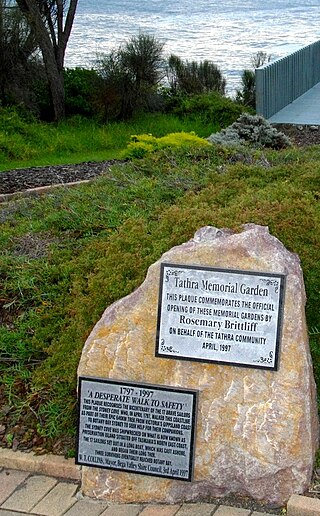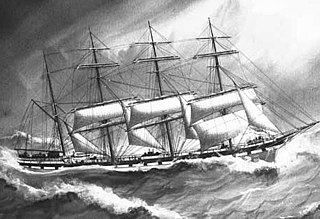Related Research Articles

Robinson Crusoe is an English adventure novel by Daniel Defoe, first published on 25 April 1719. Written with a combination of Epistolary, confessional, and didactic forms, the book follows the title character after he is cast away and spends 28 years on a remote tropical desert island near the coasts of Venezuela and Trinidad, encountering cannibals, captives, and mutineers before being rescued. The story has been thought to be based on the life of Alexander Selkirk, a Scottish castaway who lived for four years on a Pacific island called "Más a Tierra" which was renamed Robinson Crusoe Island in 1966. Pedro Serrano is another real-life castaway whose story might have inspired the novel.

The mutiny on the Royal Navy vessel HMS Bounty occurred in the South Pacific Ocean on 28 April 1789. Disaffected crewmen, led by acting-Lieutenant Fletcher Christian, seized control of the ship from their captain, Lieutenant William Bligh, and set him and eighteen loyalists adrift in the ship's open launch. The reasons behind the mutiny are still debated. Bligh and his crew stopped for supplies on Tofua, losing a man to natives. Bligh navigated more than 3,500 nautical miles in the launch to reach safety and began the process of bringing the mutineers to justice. The mutineers variously settled on Tahiti or on Pitcairn Island.

HMS Pandora was a 24-gun Porcupine-class sixth-rate post ship of the Royal Navy launched in May 1779. The vessel is best known for its role in hunting down the Bounty mutineers in 1790, which remains one of the best-known stories in the history of seafaring. Pandora was partially successful by capturing 14 of the mutineers, but wrecked on the Great Barrier Reef on the return voyage in 1791. HMS Pandora is considered to be one of the most significant shipwrecks in the Southern Hemisphere.
Jeronimus Cornelisz was a Dutch apothecary and Dutch East India Company merchant who sailed aboard the merchant ship Batavia which foundered near the Australian mainland. Cornelisz then led one of the bloodiest mutinies in history.

General Grant was a 1,005-ton three-masted bark built in Maine in the United States in 1864 and registered in Boston, Massachusetts. It was named after Ulysses S. Grant and owned by Messers Boyes, Richardson & Co. She had a timber hull with a length of 179.5 ft, beam of 34.5 ft and depth of 21.5 ft. While on her way from Melbourne to London, General Grant crashed into a cliff on the west coast of main island of the Auckland Islands of New Zealand, and subsequently sank as a result. Sixty-eight people drowned and only 15 people survived.

Strange Objects is a 1990 novel by Australian author Gary Crew.

A castaway is a person who is cast adrift or ashore. While the situation usually happens after a shipwreck, some people voluntarily stay behind on a desert island, either to evade captors or the world in general. A person may also be left ashore as punishment (marooned).

Paradise Road is a 1997 Australian war film directed by Bruce Beresford, about a group of English, American, Dutch, and Australian women who are imprisoned by the Japanese in Sumatra during World War II. It stars Glenn Close, Frances McDormand, Pauline Collins, Julianna Margulies, Jennifer Ehle, Cate Blanchett in her feature film debut, and Elizabeth Spriggs. The film received mixed reviews from critics.

Two Years' Vacation is an adventure novel by Jules Verne, published in 1888. The story tells of the fortunes of a group of schoolboys stranded on a deserted island in the South Pacific, and of their struggles to overcome adversity. In his preface to the book, Verne explains that his goals were to create a Robinson Crusoe-like environment for children, and to show the world what the intelligence and bravery of a child were capable of when put to the test.

In the Wake of the Bounty (1933) is an Australian film directed by Charles Chauvel about the 1789 Mutiny on the Bounty. It is notable as the screen debut of Errol Flynn, playing Fletcher Christian. The film preceded MGM's more famous Mutiny on the Bounty, starring Charles Laughton and Clark Gable, by two years.

Sydney Cove was the Bengal country ship Begum Shaw that new owners purchased in 1796 to carry goods to Sydney Cove, and renamed for her destination. She was wrecked in 1797 on Preservation Island off Tasmania while on her way from Calcutta to Port Jackson. She was among the first ships wrecked on the east coast of Australia.
Benjamin Cropp is an Australian documentary filmmaker, conservationist and a former six-time Open Australian spearfishing champion. Formerly a shark hunter, Cropp retired from that trade in 1962 to pursue oceanic documentary filmmaking and conservation efforts. One of his efforts for The Disney Channel, The Young Adventurers, was nominated for an Emmy award.

The Most Dangerous Game is a 1932 American pre-Code horror film, directed by Ernest B. Schoedsack and Irving Pichel, starring Joel McCrea, Fay Wray and Leslie Banks.

Dundonald was a British four-masted steel barque measuring 2,205 gross register tons launched in Belfast in 1891. It was involved in a wreck in 1907 in the New Zealand Subantarctic Islands. Only 15 of its 28 crew survived; they were rescued seven months later by a scientific expedition.

Wiebbe Hayes was a Dutch soldier known for his leading role in the suppression of Jeronimus Cornelisz's massacre of shipwreck survivors in 1629, after the merchant ship Batavia was wrecked in the Houtman Abrolhos, a chain of coral islands off the west coast of Australia.

The Fourth Wish is a 1976 Australian family film directed by Don Chaffey based on a three-part 1974 TV drama from the ABC.
The Invercauld was an 1,100-ton sailing vessel that was wrecked on the Auckland Islands in 1864.
Little Jungle Boy is a 1970 Australian television film.

The Wiebbe Hayes Stone Fort on West Wallabi Island is the oldest surviving European building in Australia and was built in 1629 by survivors of the Batavia shipwreck and massacre. West Wallabi Island is 63 km (39 mi) from the coast of Western Australia.

The complement of HMS Bounty, the Royal Navy ship on which a historic mutiny occurred in the south Pacific on 28 April 1789, comprised 46 men on its departure from England in December 1787 and 44 at the time of the mutiny, including her commander Lieutenant William Bligh. All but two of those aboard were Royal Navy personnel; the exceptions were two civilian botanists engaged to supervise the breadfruit plants Bounty was tasked to take from Tahiti to the West Indies. Of the 44 aboard at the time of the mutiny, 19 were set adrift in the ship's launch, while 25, a mixture of mutineers and detainees, remained on board under Fletcher Christian. Bligh led his loyalists 3,500 nautical miles to safety in the open boat, and ultimately back to England. The mutineers divided—most settled on Tahiti, where they were captured by HMS Pandora in 1791 and returned to England for trial, while Christian and eight others evaded discovery on Pitcairn Island.